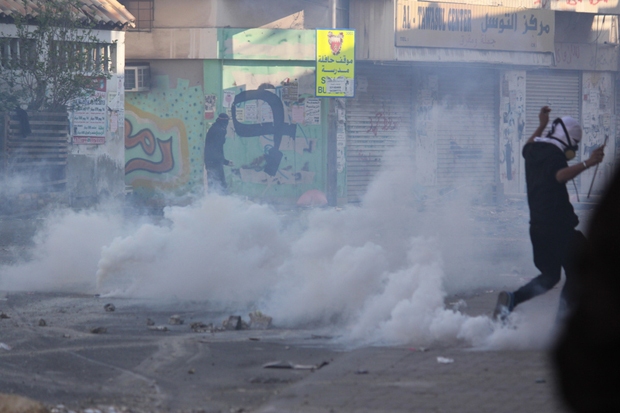Index relies entirely on the support of donors and readers to do its work.
Help us keep amplifying censored voices today.

Made in Britain? Physicians for Human Rights (PHR) called for the immediate suspension of the use of excessive, indiscriminate and systematic use of tear gas against civilian protesters and densely populated Shia neighbourhoods in Bahrain (Image: Iman Redha/Demotix)
The Arab Spring has not stopped Britain from helping crush free expression and freedom of assembly by selling crowd control gear to authoritarian states including Saudi Arabia and Bahrain.
Analysis of newly-published data on export licences approved by the UK government have revealed ministers backed over £4 million of tear gas, crowd control ammunition and CS hand grenade sales over the last two years to Saudi Arabia – one of the most repressive states in the world.
The British government also allowed crowd control ammunition to be sold to Malaysia and Oman, as well as tear gas to Hong Kong and Thailand.
It gave the green light to anti-riot and ballistic shields to four authoritarian regimes listed by the Economist Democratic Index: the United Arab Emirates, Bahrain and Azerbaijan, as well as Saudi Arabia.
Its only refusal for an export licence in 2013 for equipment which could be used to suppress internal dissent was for an order of CS hand grenades and ‘tear gas/irritant ammunition’ to Turkey.
A lack of transparency across the secretive arms sector makes it difficult to establish which companies are providing the arms – or how the country in question intends to use them.
But the Geneva Convention forbids the military use of all gas weapons, meaning the UK government would have assumed the tear gas was for use against civilian protesters.
Brief explanatory notes included in the export licences data suggest all those mentioned above are primarily for use against domestic populations.
The notes typically state the licence is granted “for armed forces end use” or “for testing and evaluation by a government / military end user”.
The only exception is the note for a sizeable order of anti-protest equipment for Brazil, which makes clear the export licence is granted for “armed forces end users not involved in crowd control / public security”.
Further evidence has emerged that Britain’s leading arms firm, BAE, has signed a £360 million contract with an unnamed Middle Eastern country for the upgrade of armoured personnel carriers whose primary use is against protesters.
Industry insiders believe the improvements are being made in Saudi Arabia to a stockpile of the vehicles left in the country by the United States military.
BAE’s chairman Sir Roger Carr said contractual commitments prevented him from commenting at the defence giant’s annual general meeting in Farnborough yesterday.
He faced heckling and hissing from vocal critics in the audience who had infiltrated the two-hour question-and-answer session, but insisted BAE was “helping to preserve world peace” and that the company “are not undermining the broader international rules” of the arms trade.
Speaking afterwards, however, a member of BAE’s board suggested the “natural place for these decisions is with government” rather than the company.
“I’m not abrogating our moral responsibility,” he said, “but it’s right that the burden of these difficult decisions is on the government because, in the UK at least, this is an elected democracy.”
Britain’s parliament, at least, has proved reluctant to provide a critical voice on the UK’s arms trade.
Opponents had alleged Saudi Arabian troops which intervened to crush the Arab Spring in Bahrain had received British military training. A recent report from MPs accepted the Foreign Office’s rejection of British complicity, with ministers arguing none of the training had taken place “in a repressive way”.
The Commons’ foreign affairs committee did, however, call on the government to “adhere strictly to its existing policy to ensure that defence equipment sold by UK firms are not used for human rights abuses or internal repression”.
Its request for the government to provide further evidence that it is doing so in practice did not meet with a positive response.
Officials said the risk that export licence criteria might be broken is “factored into” the original decision to grant the licence.
The Foreign Office stated: “There are rigorous pre-licence checks and, for open licences, compliance audits at the exporters’ premises in the UK. We will continue to scrutinise carefully all arms sales to Saudi Arabia.”
Many believe the current export licence regime is not fit for purpose, however. In 2013 the UK approved military licences to a total of 31 authoritarian regimes including Russia, China, Qatar and Kuwait.
“BAE couldn’t sell the weapons they do to these countries without the support of the UK government,” Andrew Smith of the Campaign Against The Arms Trade said.
“The UK government can stop any of these exports at any time but is choosing not to because it’s putting arms company profits ahead of human rights.”
He suggested the government’s decision to exclude Bahrain from its list of ‘countries of concern’ on human rights was “politically motivated”.
And he warned arms sales went beyond small-scale arms and ammunition to include much bigger purchases like fighter jets.
“The reason the Saudis buy from Britain is not just because Britain is willing to sell arms,” Smith added, “but also because it comes with political support and the endorsement and silence of the British government.”
This article was posted on May 9, 2014 at indexoncensorship.org

(Photo illustration: Shutterstock)
The parliamentary struggle over the UK government’s gagging bill, which has overshadowed Westminster in recent months, is all but over. And the end result is bad news for British democracy.
Yesterday ministers secured their final victories against freedom of speech campaigners. Their plans to make it much harder for charities to get their voices heard during election periods – exactly when their contribution is needed most – are about to become law as a result.
The transparency of lobbying, non-party campaigning and trade union administration bill, to give it its full title, has troubled civil liberties activists from start to finish.
Its attempted clampdown on the public affairs industry by forcing third-party lobbyists on to a statutory register, has been roundly dismissed because in-house lobbyists – the vast majority – are simply not included.
This flawed solution to the bill’s main target has been accompanied by a brutal attack on the voluntary sector. The government’s aim was to force small-scale charities, community groups and the like on to a complicated regulatory regime.
Such would have been the chilling effect of this law that most local-issue campaigning during elections would have been stifled when it came to election time. No surprise the legislation was dubbed the ‘gagging bill’.
As it was, bitter opposition to the proposals finally forced ministers to the negotiating table. Instead of lowering the threshold at which charities must begin reporting their activities to the Electoral Commission watchdog, it was increased to £20,000.
This was a major concession. There were other, smaller retreats too, on how long ‘election time’ actually means — it was reduced from one year to 7.5 months — and by excluding some costs like spending on translation into Welsh, or security, from controlled expenditure.
Ultimately, though, these alterations failed to change the bill’s big impact: that important voices encouraging politicians to make promises, and then holding them to their word, are to be stifled.
The Lords did its best to limit the damage. It inflicted embarrassing defeats on the government, which meant when the bill returned to the Commons yesterday MPs had to vote on whether or not to overturn the changes.
As the bill was being debated in the Commons chamber the atmosphere was one of resentment and frustration from the opposition benches — and a smug superiority from ministers. They knew they had already won the war. Now they were about to win the last of its battles, too.
A critical division came over staffing costs. For the bigger household names, like Countryside Alliance or Oxfam, this really matters.
The gagging bill is reducing the total amount a campaigning group can spend in a general election period from £988,000 to £390,000. Say it employs ten staff on a £20,000 salary — by including the staffing costs, the amount actually available to spend on leaflets and demonstrations and advertising is slashed still further.
Yesterday the government whipped its MPs against the Lords amendments. Groups like 38 Degrees had been mobilising their members to urge wavering MPs to rebel. In their offices earlier this week, staff expressed delight as the number of emails sent to backbenchers who’d previously expressed disquiet shot upwards.
Back in parliament, the mood at this campaigning onslaught was grim. One MP I spoke to was so worked up he got his staff to forward me the emails as they came in, to demonstrate just how disruptive they were. The flood which followed was, indeed, deeply irritating – about 50 poured in over the course of just a couple of hours.
Elsewhere, a Tory veteran even phoned up the police to complain about a group of activists wanting to petition him at his home. The bitter irony of this didn’t pass unnoticed.
Ultimately, all the efforts to sway the Commons didn’t make much of a difference. When it came to a vote the coalition’s majority was reduced to 32. But it still won, and the Lords’ improvements were consigned to history.
What caused this diminishing of our democracy? It’s mostly the result of those in power simply not caring much for the views of others. The latest reports from Downing Street indicate that senior No 10 strategists are desperate to find ways of reducing the pledges which candidates make during general elections. It’s much easier to avoid breaking promises, after all, if you haven’t made them in the first place.
And yet that is exactly what democracy, and free speech in Britain, are about: the ability to highlight when politicians are not sticking to their commitments, and the opportunity to encourage them to stick by a cause. Charities are a vital part of this, but the gagging bill is undermining their ability to make the case.
The result is not so much a law which makes it almost impossible for small-scale charities and voluntary groups to campaign during general elections, but one which merely makes the lives of their employees more difficult and awkward.
At the end of it all, democracy in Britain has got just a little bit worse. Our future elections will be slightly poorer affairs than before. The country we were in 2013 is not the country we shall be when, in a short while, the Queen finally hands royal approval to her government’s gagging bill.
This article was published on 23 January 2014 at indexoncensorship.org